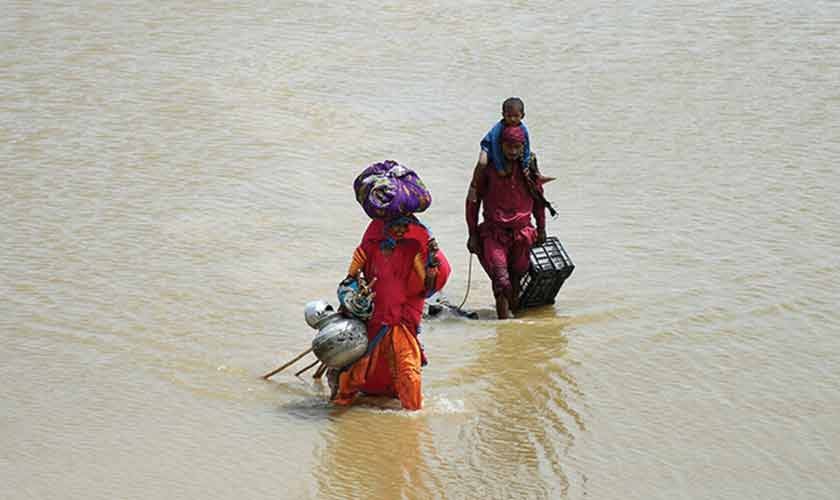The Monsoon of 2022: Beyond the Floodwaters — Addressing the Hidden Psychological Wounds in Pakistan
The monsoon of 2022 brought torrential rains across Pakistan. Although the Meteorological Department had warned about possible flooding, sooner than expected, the warnings turned into reality. Many areas of the country were submerged under water, and Sindh was no exception.
At that time, I had just assumed charge as dean of the Faculty of Medicine at my university. The vice chancellor called an emergency meeting to discuss how we could contribute to relief efforts for communities in flood-affected areas. Medical teams comprising doctors and paramedics were being dispatched to provide first aid, food, medicines, and treatment for medical conditions commonly observed in such disasters, such as skin and eye infections.
**Recognizing the Need for Psychological Support**
As a mental health professional, I could foresee that physical healthcare alone would not suffice. Acute panic and deep psychological scars are often part of the aftermath of such calamities. After a brief training on psychological first aid, I sent some medical officers, psychiatry trainees, and psychology interns to join our medical teams. This integrated team worked effectively on site, but many patients required referrals to hospitals in Hyderabad for ongoing treatment.
I had the chance to meet many of these individuals and witnessed firsthand the profound emotional pain behind the physical suffering.
**Stories That Speak Volumes**
One encounter remains etched in my memory — an old, lean man who was quiet, tears streaming down his blank face. He seemed unable to express the torrent of thoughts and feelings inside him. Struggling to find words, his companion shared that the man had lost the dowry he had painstakingly saved for his daughter’s marriage during the flood.
Without uttering a word, his grieving face spoke volumes — of dreams washed away and a broken spirit.
I also recall a mother who screamed every time she remembered her child drowning, and a farmer who lost his cattle, his livelihood. Behind every individual case was a story of immense human pain and helplessness.
The floods had not only dismantled homes and destroyed crops but also swept away hopes and shattered peace for countless people.
**The Ripple Effect: Trauma Beyond the Flood**
The problem did not end with the immediate disaster. Within weeks, many who had helped flood victims began suffering from anxiety, sleep disturbances, and trauma. During and after the flood, my team and I had the unforgettable experience of managing the various dimensions of grief.
Many survivors initially experienced shock — feeling numb and unable to grasp the scale of what had happened. Those who aided others felt intense fears of losing loved ones, belongings, or facing hunger, disease, and further disasters.
There was overwhelming grief for those who had lost family members, homes, and lifelong savings.
As people struggled to rebuild amidst instability and insecurity, we found many battling panic, anxiety, and sleeplessness. Some developed post-traumatic stress disorder (PTSD), reliving traumatic events through flashbacks and nightmares. Others experienced suicidal thoughts fueled by survivor’s guilt.
Imagine a white-collar worker, once living with dignity, now standing in a queue for food — his pride shattered, his spirit broken.
Children accompanying families of psychiatric patients often appeared withdrawn and fearful, reflecting anxiety and confusion. Adults expressed irritability, helplessness, and emotional numbness. The elderly, already frail and sick, lost their sense of safety and belonging.
**The Lasting Impact: Healing More Than Physical Wounds**
Deep psychological scars linger much longer, even after physical damage is repaired. Recognizing and treating emotional wounds is just as vital as addressing physical health conditions encountered in disasters.
True recovery goes beyond rebuilding homes and providing food or basic living necessities. It means restoring resilience, dignity, self-esteem, and hope for those who have suffered.
If psychological wounds are left unaddressed, healing remains incomplete. Fear, grief, despair, and damaged self-worth undermine motivation, disturb sleep, and weaken the body’s resilience, hampering full recovery despite adequate physical healthcare.
**A Call to Action: Empathy and Support for Mental Well-being**
This flood experience left us wondering — can we not learn this lesson and train ourselves to help those in distress more effectively? Rather than watch helplessly as bystanders, making videos or panicking, we can act with empathy by listening, connecting, and comforting those who suffer, offering them a ray of hope.
Can our governments not support these distressed people in a dignified way — protecting their self-esteem rather than diminishing it — to enable resilience, recovery, and the ability to rebuild their lives? Perhaps, in turn, those helped can extend aid to others in need.
The physical scars of disasters may heal with time, but without attention to mental well-being, the emotional wounds remain—and so does the urgency to act.
https://www.thenews.com.pk/tns/detail/1350034-floods-washed-away-all-but-tears


